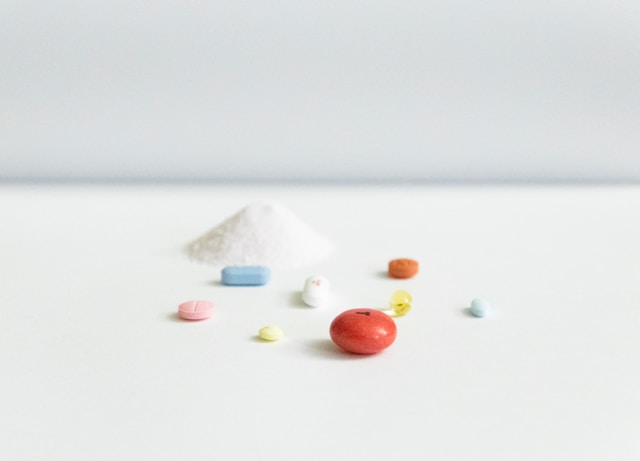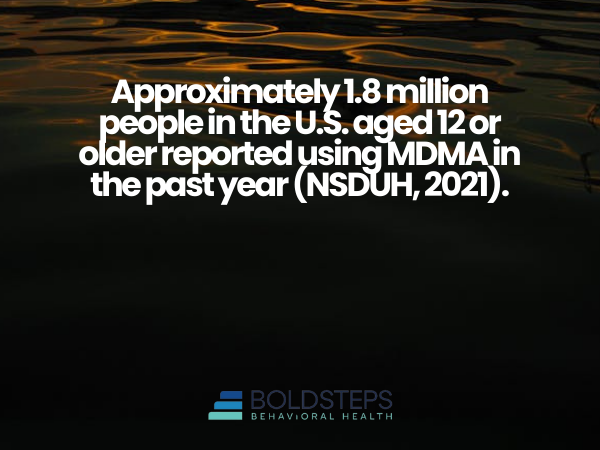MDMA, commonly known as ecstasy or molly, is a synthetic drug popular in social and recreational settings due to its euphoric and hallucinogenic effects. While often perceived as a “party drug,” MDMA misuse carries significant risks, including physical harm, psychological dependence, and long-term health consequences. Individuals struggling with MDMA addiction often find themselves caught in a cycle of emotional instability, social challenges, and physical deterioration.
The good news is that MDMA addiction is treatable. A full recovery is possible through a comprehensive care approach that addresses the underlying causes of addiction, provides medical and psychological support, and equips individuals with the tools to maintain long-term sobriety. At Bold Steps New Hampshire, we specialize in recovery programs designed to treat MDMA addiction comprehensively, including our MDMA Addiction Program, Dual Diagnosis Treatment Program, and various levels of care, such as Partial Hospitalization Programs and Virtual Treatment Programs.
Understanding MDMA Addiction
MDMA affects the brain by increasing the activity of serotonin, dopamine, and norepinephrine, neurotransmitters responsible for mood regulation, energy, and emotional processing. While the initial effects of MDMA use may feel euphoric, repeated misuse can lead to dependency and addiction, as the brain becomes reliant on these artificial chemical boosts.
How MDMA Addiction Develops
- Frequent Use: Regular use of MDMA can lead to tolerance, requiring higher doses to achieve the same effects.
- Psychological Dependence: Over time, individuals may feel unable to socialize, relax, or experience happiness without the drug.
- Neurological Changes: Chronic MDMA use depletes serotonin levels, leading to mood disorders and further dependence.
Signs of MDMA Addiction
Recognizing the signs of MDMA addiction is crucial for seeking timely help. Symptoms include:
Physical Signs
- Persistent fatigue or lack of energy.
- Jaw clenching or grinding teeth (common with MDMA use).
- Sweating, chills, or dehydration.
- Increased tolerance to the drug’s effects.
Psychological Signs
- Intense cravings for MDMA.
- Anxiety, paranoia, or depressive episodes, especially between uses.
- Difficulty concentrating or remembering things.
Behavioral Signs
- Spending excessive time and money obtaining MDMA.
- Neglecting responsibilities at work, school, or home.
- Social withdrawal or changes in friend groups to those who use drugs.
If you or a loved one is exhibiting these signs, seeking professional treatment is the first step toward recovery.
The Risks of MDMA Addiction
Although often seen as a recreational drug, MDMA misuse carries significant health and social risks that can worsen over time.
1. Physical Health Risks
- Heart and Cardiovascular Damage: MDMA raises heart rate and blood pressure, increasing the risk of cardiovascular complications.
- Hyperthermia: MDMA use, especially in physically active environments like dance clubs, can lead to dangerously high body temperatures.
- Neurological Damage: Long-term use damages serotonin pathways, which can result in permanent cognitive and emotional impairments.
2. Mental Health Risks
- Anxiety and Depression: MDMA depletes serotonin, often leading to prolonged periods of depression or anxiety after use.
- Memory and Cognitive Impairment: Chronic use affects memory, attention, and decision-making.
- Psychological Dependence: Users may feel unable to cope with stress, socialize, or feel joy without the drug.
3. Social and Lifestyle Risks
- Strained Relationships: MDMA addiction often isolates individuals from loved ones and disrupts personal relationships.
- Legal Issues: MDMA possession and distribution are illegal, carrying significant legal consequences.
- Financial Strain: Regular MDMA use can lead to financial difficulties due to the cost of the drug.
Steps Toward a Full Recovery
While MDMA addiction is challenging, it is treatable. Recovery involves a multi-step process tailored to the unique needs of each individual. Here’s a closer look at the steps toward lasting sobriety:
1. Acknowledging the Problem
The first step is recognizing the issue and seeking help. MDMA addiction often comes with denial, and reaching out for support—whether through family, friends, or a professional program—can be life-changing.
2. Medical Detox
While MDMA withdrawal is not typically life-threatening, it can be emotionally and physically challenging. Symptoms of withdrawal include:
- Extreme fatigue
- Depression or suicidal thoughts
- Difficulty sleeping or excessive sleeping
- Irritability and anxiety
Medical Detox at Bold Steps
Our Medical Detox Program provides:
- Safe Monitoring: Medical supervision to ensure a safe withdrawal process.
- Emotional Support: Helping individuals cope with the psychological challenges of withdrawal.
- Preparation for Treatment: Detox is the critical first step that prepares individuals for comprehensive care.
3. Comprehensive Treatment Programs
Following detox, individuals should transition into structured programs that address the root causes of addiction and teach essential recovery skills.
Partial Hospitalization Program (PHP)
- Intensive, structured care during the day with the flexibility to return home in the evenings.
- Combines therapy, medical care, and holistic treatments.
Intensive Outpatient Programs (IOP)
- Designed for individuals balancing recovery with work, school, or family obligations.
- Provides regular therapy sessions to build coping mechanisms and prevent relapse.
Outpatient Treatment Program
- Offers ongoing support for those in the later stages of recovery.
- Focuses on long-term sobriety maintenance and life skills development.
Virtual Treatment Program
- Provides therapy and counseling online, making treatment accessible for individuals unable to attend in person.
4. Dual Diagnosis Treatment
Many individuals with MDMA addiction also experience co-occurring mental health conditions such as anxiety, depression, or PTSD. Untreated mental health issues can increase the likelihood of relapse, making Dual Diagnosis Treatment essential.
Integrated Dual Diagnosis Treatment
- Cognitive Behavioral Therapy (CBT): Identifies and changes negative thought patterns contributing to addiction.
- Dialectical Behavior Therapy (DBT): Focuses on emotional regulation and stress management.
- Trauma-Informed Care: Addresses past trauma that may fuel substance use.
5. Behavioral Health Treatment
Addiction impacts emotional and behavioral well-being. At Bold Steps Behavioral Health, our Behavioral Health Treatment in New Hampshire includes:
- Individual Therapy: One-on-one sessions to explore personal challenges and set recovery goals.
- Group Therapy: Building a support network through shared experiences.
- Family Therapy: Rebuilding trust and fostering a supportive home environment.
6. Relapse Prevention and Aftercare
Sustained recovery requires ongoing support. At Bold Steps, we help individuals create personalized relapse prevention plans, which may include:
- Regular therapy sessions.
- Participation in peer support groups like Narcotics Anonymous (NA).
- Relapse prevention strategies, including identifying triggers and coping mechanisms.
Why Choose Bold Steps Behavioral Health?
At Bold Steps Behavioral Health, we offer compassionate, evidence-based care for individuals struggling with MDMA addiction. Here’s why our programs work:
1. Individualized Care Plans
We tailor our treatment plans to meet the unique needs and goals of each individual.
2. Full Continuum of Care
From detox to outpatient services, our programs provide support at every stage of recovery.
3. Experienced Team
Our team includes licensed therapists, addiction specialists, and medical professionals with expertise in treating MDMA addiction.
4. Accessible Options
With both in-person and virtual programs, we make recovery accessible for everyone.
Conclusion
MDMA addiction is a serious but treatable condition. Recovery requires a comprehensive approach that addresses the physical, psychological, and social aspects of addiction. At Bold Steps Behavioral Health, we provide the tools, support, and guidance needed to achieve lasting sobriety.
Take the first step today. Call us at (603) 915-4223 or visit Bold Steps Behavioral Health to learn more about our MDMA Addiction Program, Dual Diagnosis Treatment Program, and other services. Together, we can help you reclaim your life and achieve a full recovery.
FAQ on MDMA Addiction and Recovery
What is MDMA addiction?
MDMA addiction occurs when individuals misuse MDMA (ecstasy or molly) and develop a psychological or physical dependency on the drug. It often involves frequent use, cravings, and difficulty controlling consumption despite negative consequences.
What are the signs of MDMA addiction?
Common signs include:
- Cravings or intense urges to use MDMA.
- Increased tolerance, requiring higher doses to achieve the same effects.
- Neglecting responsibilities at work, school, or home.
- Experiencing anxiety, depression, or insomnia when not using MDMA.
- Financial or legal issues related to drug use.
Is MDMA addiction treatable?
Yes, MDMA addiction is treatable through a comprehensive care approach that includes detox, therapy, and relapse prevention. Professional treatment programs like those at Bold Steps Behavioral Health address the physical, emotional, and psychological aspects of addiction.
What withdrawal symptoms can occur with MDMA addiction?
Withdrawal symptoms may include:
- Fatigue or low energy levels.
- Depression and irritability.
- Difficulty concentrating or memory problems.
- Sleep disturbances, such as insomnia or hypersomnia.
What treatment options are available for MDMA addiction?
At Bold Steps Behavioral Health, we offer:
- MDMA Addiction Program
- Medical Detox Program for managing withdrawal symptoms.
- Partial Hospitalization Program (PHP) for intensive, structured care.
- Intensive Outpatient Programs (IOP) and Outpatient Treatment Program for flexible recovery support.
- Virtual Treatment Program for online access to therapy.
- Dual Diagnosis Treatment Program for addressing co-occurring mental health conditions.
Why is dual diagnosis treatment important for MDMA addiction?
Many individuals with MDMA addiction also experience mental health disorders such as anxiety or depression. Dual diagnosis treatment addresses both addiction and mental health simultaneously, reducing the risk of relapse and improving long-term recovery outcomes.



